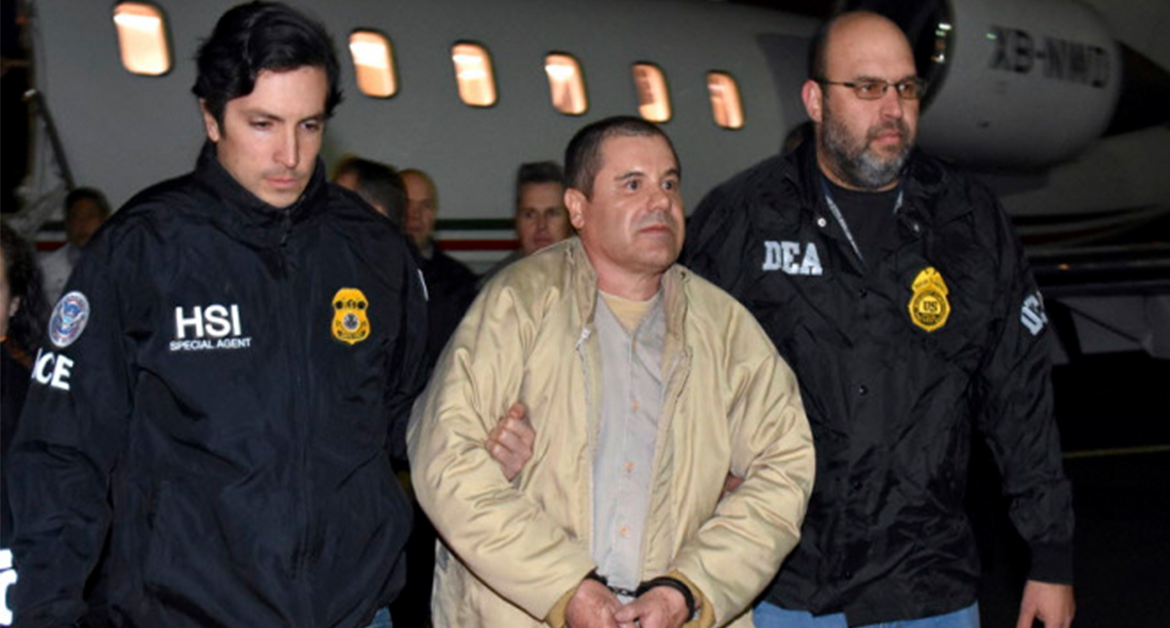El Chapo’s ‘criminal enterprise’ means life in prison
Federal jury finds Sinaloa drug boss Joaquin Guzman Loera guilty on all counts

After hearing that a jury convicted him on all counts in his federal criminal trial on February 12, Mexican drug kingpin Joaquin “El Chapo” Guzman turned, looked at his young, ex-model wife, Emma Coronel Aispuro, and blew her a kiss. Coronel, teary-eyed, gave him a thumbs up.
But it could not have gone worse for Guzman, who, depending on what you read, either appeared “emotionless” or “stunned” as U.S. District Judge Brian M. Cogan, in a federal court in Brooklyn, read the jury’s guilty verdicts against him on 10 felony counts. The charges included engaging in a criminal enterprise, conspiracy to commit murder, weapons possession, money laundering and international distribution of illegal drugs.
The results mean almost for sure that the 61-year-old Guzman, the former boss of the Sinaloa cartel who amassed a $14 billion fortune while smuggling more than 200 tons of cocaine into the United States, will spend the rest of his life in a U.S. penitentiary. The criminal enterprise charge alone mandates a life prison term. The judge scheduled a sentencing hearing for June 25.
Guzman’s defense lawyer, Jeffrey Lichtman, immediately announced that Guzman would appeal the verdicts. But that move looks futile given the weight of the prosecution’s evidence against the kingpin. He’s also been indicted by courts in six other jurisdictions.
The jury’s decision came after six days of deliberations in a trial that started last November. Fifty-six witnesses testified against Guzman, 14 of whom were once his devoted associates. Some of them are serving long prison sentences they hope authorities will reduce based on their cooperation. El Chapo’s defense team called only one witness.
Guzman’s trial revealed disturbing details of what El Chapo allegedly engaged in while running the Sinaloa drug cartel in northwestern Mexico. Witnesses testified that Guzman and other cartel henchmen fed drugs to young girls and raped them and that he ordered the deaths of his own family members. The government further charged that he smuggled $100 million in cocaine to the United States using airplanes, fishing boats, submersible ships, oil tankers, cans of jalapenos and an underground tunnel stretching from Mexico to Arizona.
Prosecutors presented evidence that Guzman and his cartel partners secreted and sold heroin, marijuana and fentanyl in a criminal enterprise extending from northern Mexico to drug suppliers in Colombia, Ecuador and Panama.
One of the government’s witnesses, Guzman’s former Sinaloa lieutenant Alex Cifuentes Villa, claimed that in 2012, El Chapo delivered a $100 million bribe to then-Mexican President Enrique Pena Nieto to cancel the country’s nationwide search for him after a 2001 prison escape.
Nieto’s former spokesman vehemently denied it, stating that under Pena’s leadership, the Mexican military located and arrested El Chapo in 2016, following the kingpin’s 2015 escape from a Mexican federal prison via a tunnel beneath his cell dug by cartel employees.

The trial also had moments of unusual drama. Guzman’s former mistress, Lucero Guadalupe Sanchez Lopez Sanchez, broke down on the stand while professing that she still had feelings for Guzman. She also told how, in 2014, when Mexican marines and U.S. agents raided the house in Mexico she shared with Guzman, she followed as he ran from their bed naked into an escape tunnel and avoided capture.
One day, with Lopez set to testify, Guzman and his wife, Coronel, showed up in court wearing red velvet jackets, seen as a gesture of solidarity against the former mistress. Coronel herself, always dressed to the nines, seemed to revel in the attention she attracted from news reporters outside and within the courtroom, and her 400,000 followers on Instagram.
The U.S. government’s case relied on the assistance of a broad range of federal law enforcement agencies, including the FBI, DEA, Homeland Security and the Coast Guard, as well as cooperating agencies in Latin America.
Security concerns during the trial prompted federal officials to order mandatory “active shooter” training for courtroom staff and deploy police snipers and bomb-sniffing dogs. But nothing serious occurred.
Judge Cogan ordered that members of the jury, for their protection, remain anonymous and under sequestration for the trial. Earlier, the federal grand jury that indicted Guzman reported that he “employed ‘sicarios’ or hitmen, who carried out hundreds of acts of violence, including murders, assaults, kidnappings, assassinations and acts of torture at the direction of the defendant.”
Feedback or questions? Email blog@themobmuseum.org





